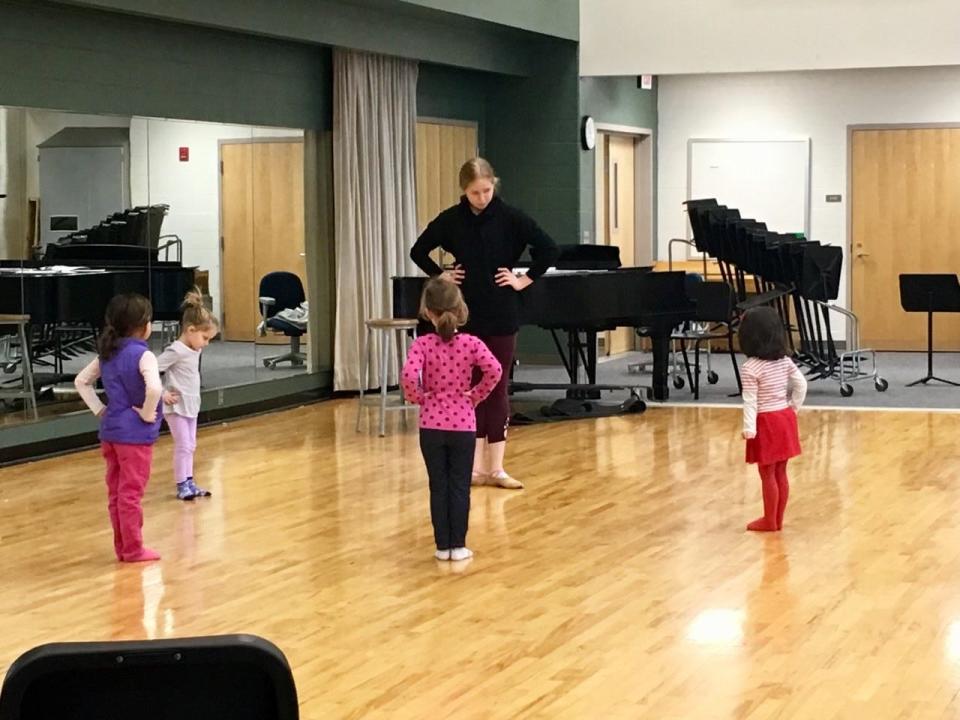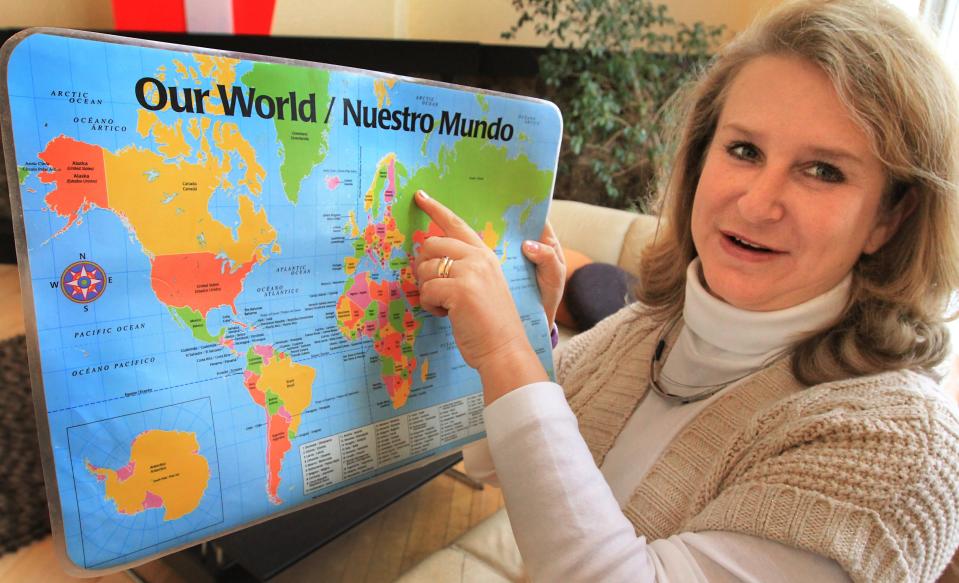Why Russia's invasion of Ukraine forced this Carmel school to change its name
Once a week, a Carmel cultural school teaches kids math, science and chess. Recently, their main subject — the namesake for their school — thrust them into an unfamiliar, overwhelming spotlight.
“The attention the school was getting in the last two months is unbelievable,” Natalia Rekhter, director of the (former) Russian School of Indiana, said.
The school typically stays out of politics, Rekhter said, but they felt compelled to speak out and condemn Russia’s invasion of Ukraine. Over the past two months, they’ve collected money for Ukrainian relief and sent medical supplies overseas, through a nonprofit called Indiana Supports Ukraine.
But their "Russian" name put them in a precarious spot.
In the past, it was a linguistic nod to their shared Eastern European heritage, uniting families from Russia, Ukraine, Moldova and Belarus who immigrated to the U.S. after the collapse of the Soviet Union.
Today, it is a painful reminder of the ongoing horrors of war.
“When the war started … you can't even imagine how much it impacted people. People were crying,” Rekhter said. “People still cannot talk about it without crying.”
Since the war, they’ve received dozens of phone calls and messages about Russia, Ukraine and the school name, Rekhter said. Upon reflection with the school board and teachers, they decided it was time for a change. Rekhter wrote a piece for the weekly Current in Carmel publication.
“We feel that our name no longer represents us,” she wrote. She asked for suggestions on behalf of the school and received about 50 responses, she said.
The final name is an amalgam of those suggestions. They settled on: The Heritage School/Multicultural Education Center. (They're still working on fully updating the website and Facebook page).
“I also thought (the old name) … was not fair for our students’ families who are from Ukraine because to them, it's very sensitive,” teacher Irina Yoshida said. “Right now, some of them, they don’t want to be with anything Russia.”
“But within our Russian-speaking community in Indiana, we don’t have any problems,” Yoshida added. “Ukrainians and Russians, we are still together.”
For subscribers: Russian war on Ukraine sparks Indianapolis cultural revival, opens new chapter for diaspora
Not 'just' a Russian school
The change is a gesture of solidarity with Ukrainian families, but it’s also something the school has considered in the past, to better represent their diversity.
The old name “doesn’t reflect who we are,” Yoshida said. “We offer a lot of classes in English and not all our classes are related to language.”
The school offers various levels of math, chemistry, physics and SAT prep for parents seeking extra tutoring for their kids. Yoshida remembers explaining to potential families that despite the name, they didn’t have to be Russian to join classes. They previously taught art, dance and theater, too, but they had to pause in-person classes during the pandemic.
"Parents want different things," Sergei Filatyev, a teacher, said. "(For) some students, parents say the (child) doesn't completely understand school ... some other cases, parents say, 'Well he aces everything in school, so I want him to be challenged.'"
Half of the school’s population is of Russian origin, but they have students from all the former Soviet nations, Rekhter noted, and even China, India, Poland and Australia. With the growing curriculum and diversity, their mission has evolved.
“The focus (became) not only preserving Russian culture, but also on education and … being like a multicultural center, so to speak," Rekhter said.

Like other cultural schools, The Heritage School/Multicultural Education Center was founded to help children from immigrant families learn their family’s language and stay connected with their heritage. But this school, in particular, has a uniquely multicultural origin story, too.
It was founded in 1994 by three families from Moldova, Russia and Ukraine, who fled to the U.S. as Jewish refugees. They started classes at an Indianapolis apartment complex, Rekhter said, with families meeting outside under a tree. Parents volunteered to teach Russian language, Russian history and culture and even “physical education,” where they just played games outside.
Over time, the school grew and formalized, with classes at the Jewish Community Center, then University High School, and today, at Carmel High School. Even as it expanded, families maintained a sense of kinship.
“It’s not (just) the school, it’s a whole community,” Rekhter said.
Supporting Ukraine while upholding Russian heritage
That’s why the war in Ukraine is particularly painful, Rekhter said. Even after the collapse of the Soviet Union and the creation of different countries, there are still shared roots and a common language in the region.
Families like Rekhter’s often have ties to several countries. Her family is originally Russian, for instance, but her parents were born and raised in Ukraine. She remembers childhood trips to visit her grandmother in Ukraine.

"It's personal," Rekhter said. "It's personal for almost everybody because it used to be one country, USSR. ... It's impossible to even imagine.
“I don’t know how to explain it to you. It's heartbreaking. Every time I'm thinking about it. I'm the least emotional person in the world, nothing can bring me to tears. But every time I'm thinking about wars, it brings me to tears.”
At the school this spring, they’ve focused on fundraising and finding ways to help Ukraine during the war. This summer, they will start hosting English classes for Ukrainian refugees — for free. In August, they hope to host a Ukrainian festival, with food, dancing and music, alongside the organization Indiana Supports Ukraine.
They support Ukraine, unequivocally, Rekther said, but that doesn’t mean they are denouncing their Russian heritage. Nor did they feel forced or pressured to make the name change, Yoshida said.
“Russia is not Putin,” Rekhter said. “It's much bigger, much deeper. It's an old country with an old history and an old culture.”
“It’s complicated,” Yoshida said. “I think there's a lot of things to be proud of, and there's a lot of things to be ashamed of.”
Even with a different name, students at The Heritage School/Multicultural Education Center, will continue to learn math, science, Russian and Ukrainian. Most come from post-Soviet Union families, like the ones who first gathered under a tree in 1994, but some of them come from different continents, too.
“I love that the mission of our school can do both things,” Yoshida said. “That we can promote our culture, and we can teach students from very different backgrounds.
“You can always conserve and keep with your heritage (and) culture, but also absorb other cultures.”
Contact Rashika Jaipuriar at rjaipuriar@gannett.com and follow her on Twitter @rashikajpr.
This article originally appeared on Indianapolis Star: Why the Russian School of Indiana in Carmel changed its name

